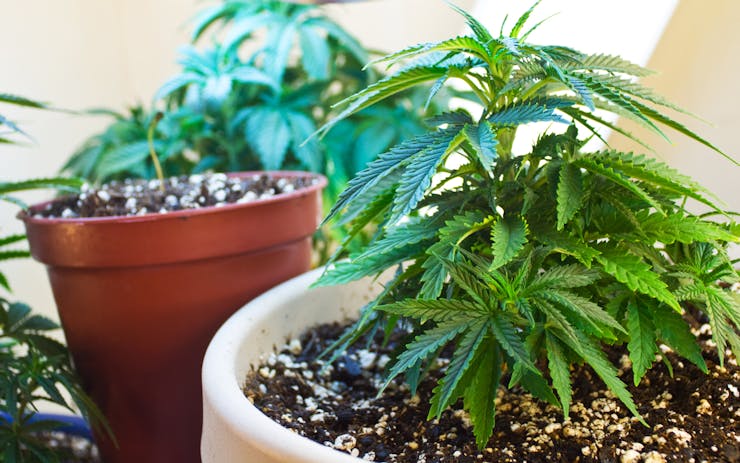Washington is currently the only state to have legalized cannabis without also allowing adults to grow their own at home. While the state does allow medical patients to grow a few plants, the casual home gardener is out of luck.
Now a new law has many speculating that homegrow could finally be in the works. The so-called Cannabis Omnibus Bill (SB 5131), passed by the Legislature in April, includes a provision directing regulators at the Washington State Liquor and Cannabis Board (LCB) to conduct a feasibility study for adult-use homegrow. The recommendations from that study could, in theory, turn into a viable bill in the next legislative session, which kicks off in January.
So is homegrow finally coming to Washington state? Green-thumbed enthusiasts might not want to get their hopes up just yet.
This isn’t the first time homegrow has been proposed and debated. Given what we’ve learned from past efforts, this one doesn’t look promising. Each time it’s come up, the LCB—the very agency now tasked with conducting the homegrow feasibility study—has been one of the loudest voices of opposition.
“We firmly believe that marijuana should be regulated very similarly to alcohol, and home brewing is legal in most states.”
Advocacy on the subject began in earnest in 2015, when state Sen. Jeanne Kohl-Welles sponsored SB 6083, a bill that would have allowed adults to grow up to six plants for personal use. Allowing homegrow, the bill argued, would cut into the black market, clarify the complicated system of patient authorizations and protocols, and “establish more equity between marijuana and home beer brewing and wine making for casual users of marijuana.”
In response, the LCB submitted a letter urging lawmakers to oppose the bill. “We believe these provisions would in fact undermine the legal market created for recreational consumers of marijuana,” the agency wrote, “and thusly contradict the guidelines as set forth by the U.S. Department of Justice in the Cole Memorandum.”
The LCB also suggested legalizing homegrow would increase youth access to cannabis, and it took issue with the idea that homegrow should be regulated similarly to home brewing. The government doesn’t view the two substances similarly, the agency noted, and even federal law prohibits home alcohol distillation. “Furthermore,” the LCB letter ends, “tobacco regulations do not allow for home production.”
Needless to say, the bill didn’t pass.
The 2017 session saw a more promising push. HB 1212, which would have allowed adults to grow up to six plants for personal use, passed out of the Commerce and Gaming committee unanimously with a “do pass” recommendation. But from there the effort fell flat. The bill was pulled from the House floor into the Finance Committee, where it eventually died.
“We were told it was because of lack of support in the Senate,” said John Novak, a homegrow advocate and medical marijuana activist who worked on the bill. However, he suspects it was actually because of the bill’s fiscal note.
Fiscal notes are brief estimates of a piece of legislation’s cost, and the one for HB 1212 included two separate wet blankets. Both came courtesy of the LCB.
Shop highly rated dispensaries near you
Showing you dispensaries nearThe first was the agency’s suggestion, echoing the adult-use cannabis lobby’s position on the subject, that “some” retail customers would opt to grow their own and that “this would have a negative impact on marijuana excise tax receipts.” Not exactly music to legislators’ ears.
The second was a rather eye-popping annual enforcement cost of $331,464. That estimate was based on the assumption that the LCB would be the chief agency monitoring homegrows and that there would be roughly 10,000 homegrows for them to monitor (though to be fair, they note that they are “uncertain as to how many grows might result [from this legislation].”) The estimate offer a breakdown of the cost per 1,000 grows, but a busy lawmaker glancing over it could easily latch on to that top-line figure.
Particularly disappointing, Novak said, was the fiscal note’s methodology on that point.
“The response I got back from one of their agents who worked on [the fiscal note] was that they just correlated the data from marijuana producers that they said generally matched the description of what people would be calling to complain about,” he complained.
In other words, the agency assumed small, personal grows would draw complaints at the same rate as commercial cultivation. “They used commercially licensed business to try to say residential things would be the same.”
Conflating the two doesn’t make sense, as residential grows are generally much more discreet. And because they don’t have to announce themselves to the general public, he added, they would also avoid the numerous complaints generated by commercial grows with neighbors who oppose cannabis on principle alone.
Asked whether the agency stands by that data for the upcoming study, LCB spokesman Brian Smith said, “We’ll have research to do on this topic in advance of the report we’re responsible for writing. Our definitive answer will be available once we deliver that report.”
He noted that the agency is given fewer than 48 hours to deliver input for fiscal notes, and that the LCB typically has numerous bills to weigh in on. “We make our best determination based on the information we have available.”
Why Homegrow Matters
All this might sound like a lot of fuss for what is, essentially, the right to get high on your own very small supply, but many consider homegrow to be a vital part of cannabis legalization. The Marijuana Policy Project (MPP), which has authored many of the nation’s legalization measures, includes limited adult-use homegrow in every bill and initiative it writes.
“We firmly believe that marijuana should be regulated very similarly to alcohol, and home brewing is legal in most states,” Morgan Fox, the MPP’s communications director, told Leafly, adding that it’s also a matter of personal liberty.
“People who consume marijuana should not be forced to take part in the retail market,” Fox said, “and home cultivation is really the only way to do that.”
Indeed, one of the chief complaints among people who use cannabis for medical or therapeutic purposes is being forced to purchase their medicine from LCB-licensed retail stores, where they often can’t find the particular strains and products they need.
“If you have big growers and a closed system like I-502, you’re actually reducing the number of strains that patients have access to, and adults for that matter,” Novak said. “Not to mention the ability to control what you put on your plants.”
Adult-use homegrow would allow patients to grow, share, and store more medicine than they currently can without signing up for a state-run patient registry. Many patients say they’re afraid of joining the registry because they fear being identified as a medical cannabis patient could put them at risk of federal enforcement actions or cause them to lose other privileges, such as gun ownership. Though the state has claimed the registry is protected from federal access, many patients are unconvinced.
But for all those benefits, Novak isn’t holding his breath.
“Two years in a row, they’ve basically tried to mislead the legislators on this matter,” he said of the LCB. That doesn’t bode well for the feasibility study. “To have all of this in their hands is kind of troubling to me,” he said. “If they come back and say, ‘No,’ what reason do any of the legislators have to even try to fight for it at that point?”
Novak , who made a name for himself as a public-records-requesting thorn in the LCB’s side, once told Leafly, “I just want to grow my plants and share with my friends and family. I’m pretty much out of this whole thing as soon as they allow all adults to grow some plants themselves. I’m done.” But he’s not optimistic HB 5131’s study will get him out of legislative hearings and back into his garden.
“I could be wrong,” he mused. “The WSLCB could come back and say, ‘Y’know, why the hell not.’ But for the last two or three years, they’ve been fighting against it hard.”
His advice to those who saw the omnibus bill as an opening? “Keep on dreaming. I don’t think it’s going to happen.”





